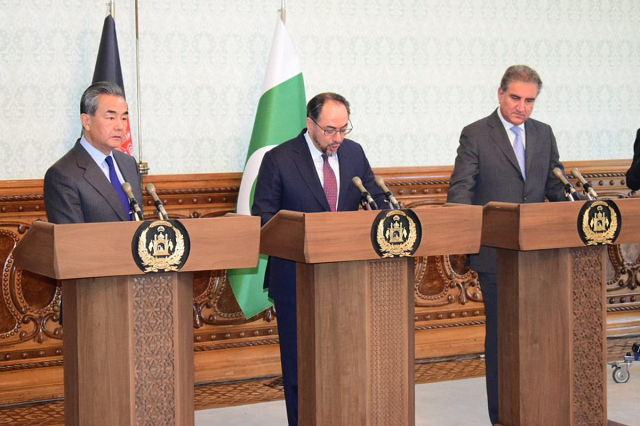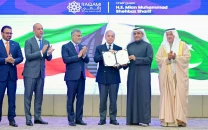China offers to help reduce Af-Pak trust deficit
Islamabad, Beijing and Kabul ink MOU on anti-terrorism cooperation

Foreign Minister Shah Mehmood Qureshi, Chinese Foreign Minister Wang Yi and Afghan counterpart Salahuddin Rabbani.
PHOTO: TWITTER/ FOREIGN OFFICE
The MoU was signed by Foreign Minister Shah Mehmood Qureshi, Chinese Foreign Minister Wang Yi and Afghan Foreign Minister Salahuddin Rabbani. Afghan President Ashraf Ghani witnessed the signing ceremony.
Speaking at a joint press conference, Foreign Minister Qureshi called for a joint strategy to eradicate the menace of terrorism from the region. His Afghan counterpart, Rabbani, also stressed the need for collective efforts to address the "common challenge" of terrorism.
Standing with them, Chinese Foreign Minister Yi remarked that both Afghanistan and Pakistan were friends of China and that Beijing would extend every possible cooperation to build trust and confidence between the two countries.
Qureshi told the press conference that the region "can only defeat terrorism if we join hands" and terrorist organisations would take full advantage of the inability of the neighbouring countries to achieve peace. "We can only defeat terrorism if we join hands," he said.
"We today did recognise there are entities like Da’esh, like ETIM [East Turkistan Islamic Movement], IMU [Islamic Movement of Uzbekistan] that if they do not see peace in the region, they will take advantage of that situation and gain ground, and it is in our collective interest to defeat such organisations."
He said Pakistan would extend cooperation to bring all the Afghan groups to the talks but it would be up to the Afghans themselves as to how they wanted to achieve the goal of peace. "I am here to encourage the different factions within Afghanistan to reconcile. Pakistan will play its role as we will do our best to push the reconciliation process forward but it's ultimately an Afghan decision," Qureshi said.
Rabbani stated that collective efforts were required to address the common challenge of terrorism. "We desire to strengthen our relations with Pakistan," the Afghan foreign minister said. He also appreciated the Chinese One Belt One Road (OBOR) initiative.
US-Taliban talks arranged for Monday: PM
On the occasion, Foreign Minister Yi announced that China would assist both Pakistan and Afghanistan to improve their bilateral relations and also help them in their connectivity projects, including a rail line between Peshawar, Kabul and Kandahar.
"The three sides have agreed to seriously implement an MoU signed during this dialogue on trilateral cooperation in the fight against terrorism," Yi said. "It won't only push forth trilateral cooperation between our three countries, but will also prove useful in keeping the peace and stability of this region."
"[Both Pakistan and Afghanistan have agreed] to resolve differences through friendly consultations. If there are issues that cannot be solved, then they must be handled appropriately and prevented from affecting the progress in improving bilateral ties," Yi continued.
Reiterating his country's commitment to play an effective role in bringing Islamabad and Kabul closer, he said: "As China is a mutual friend of Afghanistan and Pakistan, we approve of this. We are also willing to provide support and help for Pakistan and Afghanistan to improve their ties."
FM Qureshi to visit Kabul on Dec 15
Earlier, addressing the second Afghanistan-China-Pakistan foreign ministers dialogue, the Qureshi said that the Afghan people had been witnessing terrorism for the past 40 years. He reiterated Pakistan's commitment to Afghanistan's rebuilding.
"Soon we are going to inaugurate Jinnah and Logar hospitals in Kabul. Both the hospitals are a gift from Pakistan to the Afghan people," the minister announced. "We are proud of the fact that we have been hosting our Afghan brothers and sisters for the past four decades," the minister stated.
Qureshi reminded that Pakistan had been a victim of terrorism and had rendered huge sacrifices in the fight against terrorism. "Pakistan has a very firm stance on terrorism and condemns it in all its forms and manifestations," he said, adding that better border management and intelligence-sharing will be greatly beneficial for both the countries.
Rabbani stressed the need for collective efforts to tackle terrorism in the region and linked peace and stability in his country with the development and prosperity of the region. "The objective of the meeting is to further strengthen the ties and promote cooperation in different spheres," he said. The Afghan minister also extended his country's support to China's Belt and Road Initiative (BRI).
Foreign Minister Yi, in his address, extended China's complete support to Afghanistan peace and reconciliation process. He called for bringing Taliban to the negotiating table to further the peace process in Afghanistan.
"We will play our role to reduce trust deficit between Pakistan and Afghanistan," Yi said. "We support an Afghan-led and afghan-owned peace process."
Yi also said that his country desired to make Afghanistan a part of the China-Pakistan Economic Corridor (CPEC) project.
It was Foreign Minister Qureshi's second visit to Kabul since assuming office earlier this year. During the visit he also held bilateral meetings with Afghan President Ghani, Chief Executive Abdullah Abdullah and Foreign Minister Yi.
Talking to Ghani, Qureshi expressed hope that the trilateral dialogue forum would help promote connectivity as well as regional peace and stability.
Ghani thanked Qureshi for participating in the trilateral dialogue and his assurance of cooperation.
During the talks with Chief Executive Abdullah, the foreign minister reiterated Pakistan's commitment to peace in the region. Abdullah hailed Pakistan's role in reconciliation process in Afghanistan and thanked Prime Minister Imran Khan and Qureshi for their cooperation.
He expressed hope that the bilateral relations would touch new heights during the government of Prime Minister Imran.
Meanwhile, Qureshi visited the Ministry of Foreign Affairs of Afghanistan and met his Afghan counterpart Syed Salahuddin Rabbani.
On the occasion, Rabbani thanked Qureshi for Pakistan's efforts in Afghan reconciliation.
Qureshi also met Chinese Foreign Minister Yi and discussed the possibility of technical assistance from Pakistan and China for Afghanistan's progress. They agreed that the three-way cooperation was necessary to establish peace in the war-torn country.
Earlier in the day, Qureshi told the media in Islamabad that Pakistan welcomed the Chinese initiative of holding the trilateral dialogue. "Both Pakistan and China desire peace, stability, prosperity and development in Afghanistan," he said.



















COMMENTS
Comments are moderated and generally will be posted if they are on-topic and not abusive.
For more information, please see our Comments FAQ